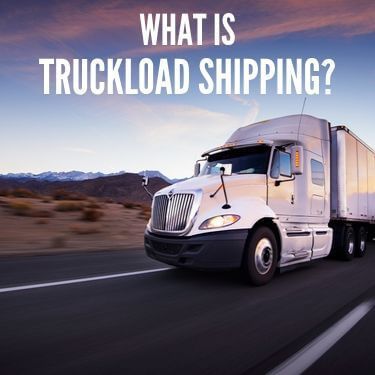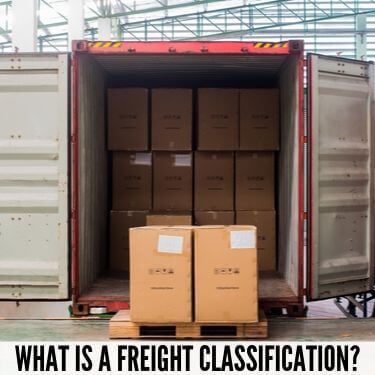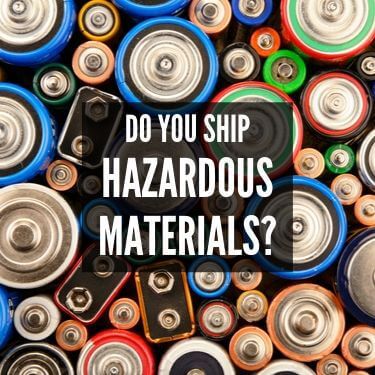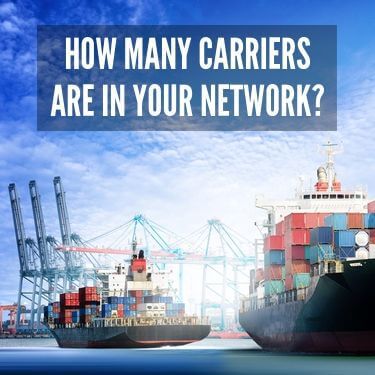If you want to know what questions to ask freight carriers, then you’ve come to the right place. In this article, we’re going to take a look at fifteen questions that you’ll need to know the answers to before you start using freight services. The questions you ask freight carriers are important. The answers they give put you in a better position to know whether you’ve found a shipping company that's compatible with the kind of operations you'd like to conduct. Not all freight companies are the same.
Finding a quality freight carrier is a significant challenge. Freight carriers are an essential part of your operation, however, so you need to make the right choice. You depend on them to do the job well to make your business viable. It can be difficult, however, to know which questions to ask freight carriers.
The good news is that you don’t need to worry: here we have fifteen critical questions to ask, complete with the kind of answers you should expect from your carrier.
A freight carrier is a company that transports goods on behalf of another company or individual. Freight companies usually manage different parts of the shipping process on behalf of the customer. Some firms offer ocean freight services which involve transporting freight on ocean liners from port to port. Others are road freight services that transport goods on trucks from depots and ports to a variety of in-land destinations. Airfreight, as you might expect, transports goods via airplane.
In the shipping industry, different freight companies are often responsible for various legs of the journey. So, for instance, a shipment of goods from Europe to the US might involve a combination of air, sea and land freight. For example, the first leg of the journey may be done via ocean freight. The cargo will then arrive at a port and get loaded onto trucks, before being taken to an airport to be loaded onto a freight aircraft operated by another company. The aircraft will fly an internal route to the destination market. Another company will then load the freight onto trucks again before taking it to its final destination. Oftentimes, the further apart the origin and destination are from one another, the more modes of transportation are used.
Truckload shipping occurs when a company consigns a large amount of a homogenous product to a single truck journey.
While the term truckload shipping might seem like a statement of the obvious, it has an important use in the freight industry. Carriers use it to distinguish it from other types of shipping where customer consignments do not use the entire interior of the hold.
Truckload shipping is usually something that only companies that need to move large quantities of material around do. For instance, a construction company might need to ship concrete blocks to a building site “by the truckload.” The more blocks the company has to transport, the more truckloads it’ll need, and the more independent journeys that trucks will make. In each case, the company is filling trucks with a single, homogenous product. Not all companies, of course, need to make large shipments. Many firms often need to ship small quantities of products.

Given that truckload shipping exists, you may also wonder whether the industry has a term for smaller consignments that don't take up all the space in the trailer. And, you'd be right. It's called “less-than-truckload” shipping, or LTL for short. This type of transportation is popular among smaller companies that don’t need to consign an entire truck to move their goods from one location to another.
Here are some notes on full truckload (FTL) and LTL shipping:
Shipping freight from Florida to Texas? See how an expert shipping ally can help.
3PL stands for third-party logistics. 3PL allows companies to outsource their shipping needs to a specialist provider, instead of attempting to perform operations in-house.
The services provided by 3PL firms can include everything from fulfilment to logistics to distribution. Thus, 3PL has a broad meaning, (which is something that can make it confusing). You might hop onto a third-party logistics website expecting to find freight services, for instance, but wind up encountering all kinds of other services, such as warehousing and even software. The best way to think of a 3PL company is as an agency that provides solutions that enable you to transport your goods from one location to another.
Here are some examples of the kinds of services that 3PL providers offer:

As you can see, the role of 3PL firms encompasses a great deal. The list here is by no means exhaustive. You may be able to find 3PL services that offer other types of services that make the movement of goods easier that we haven't discussed. Furthermore, while many 3PL companies focus on one or two areas, some operate across the board. So, for instance, you can find 3PL companies that will both fulfill and ship products on your behalf.
If you’re planning on using freight services, you must ask the shipping firm what type of commodities they ship. Some companies place restrictions on the type of goods that they will accept. You could end up in a situation where you think that you’ve found the perfect logistics partner, only to find out that they have policies against shipping your goods.
A commodity carrier might prohibit you from shipping all kinds of goods and forward you to a specialist carrier. Unacceptable items might include things like live animals, artwork, tobacco, diamonds, bullion, prescription medication, pornography, personal freight, and furs.
Shipping some commodities is banned or restricted by law in some countries and jurisdictions, so it’s worth checking ahead of time. Freight carriers may also refuse to ship particular goods based on their internal policies or rules. Most of the time, the freight company refuses to ship products not because they’re trying to be difficult, but because they want to protect the interests of their customers. Customs authorities could confiscate goods, leading to losses for the shipper.
Other items can fall into the “restricted items” category. These are items that could potentially cause issues when they go through customs. Restricted items include things like power packs containing lithium-ion batteries, watches and jewelry, supplements, and knives. It’s always best to check with authorities ahead of time whether you can make particular shipments. A knowledgeable freight carrier can do this on your behalf.
The shipping rate - sometimes called the freight rate - is the cost of delivering cargo from one location to another. As you might expect, the actual price you’ll pay depends on a variety of factors, many of which are specific to your shipments.
Here are the main determinants of the shipping rate:
Let’s say, for instance, that you want to transport coal via train from New York to Boston. The shipping company might quote you a price of $0.10 per ton per mile. The distance between New York and Boston is 220 miles. So the cost of transporting 1000 tons of coal is $22,000.
The cost, of course, isn’t as simple as this example implies, but it gives you an idea of what to expect when negotiating with a shipping company.
Furthermore, each of the factors in the list above plays an independent role in determining the cost of shipping, but they also relate to one another. A freight company, for instance, might be willing to lower the cost per unit weight over longer distances when the train does not have to make regular stops.
Of course, besides the basic shipping rate, there are other charges that a freight company might levy depending on the kind of services that you choose. These additional fees are often called accessorial charges and they bolt-on to any basic rate that the freight company asks you to pay.
Going back to the coal example above, you can imagine that the freight carrier has to do more than drive a train from New York to Boston to get the job done. It must also load and unload the coal and store it until its ready to move on.
Accessorial charges, therefore, cover the cost of additional services that you might use when you hire a freight company to move goods from one location to another. Freight companies can charge a range of accessorial charges for a variety of situations. Some companies, for instance, charge for border crossings because of the additional time that it takes. Others may charge for handling cash. You could also end up paying extra for things like diversion miles, additional stops, and storage.
The purpose of freight classification is to establish “fair” measures to standardize freight pricing. The National Motor Freight Traffic Association sets freight classification criteria. Their system, called the National Motor Freight Classification Tariff (NMFC), groups commodities into eighteen different classes based on their transportability.
What exactly determines freight classification? As with the freight rate above, it depends on a variety of factors. These include:

When choosing a freight carrier, it’s essential to find one that understands freight classifications inside out. Changes to classification can be costly, and you could end up paying more than you should if your freight partner doesn’t follow the rules thoroughly.
Your shipping company should be able to quickly tell you the classification of your freight. Many firms use so-called freight classification calculators that attempt to give you an immediate answer for what category your cargo occupies and how much you should pay.
One of the determinants of freight classification is density. The density is the weight of an item for a given volume. A one-meter cubed box that weighs two tons, for instance, has a higher density than an identical box that weighs one ton.
In the US, freight companies determine the class of the freight by measuring the freight density in pounds per cubic foot.
A freight density of less than one pound per cubic foot is 400 class freight. Freight between one but less than two pounds per cubic foot is 300 class freight and so on. As the densities rise, the freight class number falls. For goods that are over thirty pounds per cubic foot, the freight class is 60.
Not all freight companies are willing to ship hazardous materials. What’s more, some companies may refuse to send contents that are not on the official list, but that they believe still pose a danger to their operations.
Knowing whether a freight company handles hazardous materials is essential if your business depends on moving these types of goods.
Freight companies will sometimes ship hazardous materials, but you may have to complete an approval process. The purpose of this is to allow the company to get a sense of the type of hazardous products that you need to move and what precautions they need to put in place.
Hazardous materials also need to be marked in accordance with Title 49 Code of Federal Regulations (49 CFR). Hazardous materials include things like explosives, poisonous gas, and radioactive materials.

A Bill of Lading is a legal document that records the type and quantity of goods being shipped by a carrier on behalf of a shipper. The shipper signs the document before the carrier begins transit of the goods. The receiver then signs the document at the other end. The Bill of Lading, therefore, acts as a receipt, showing who has taken ownership of a particular shipment and what the shipment contains.
Understanding what the Bill of Lading is doing can be complicated, so it’s a good idea to look at a concrete example. Suppose that a freight company agrees to deliver a consignment of fuel to a gas station for a gas refinery. The logistics company loads the gas onto a tanker. Once loading is complete, a worker at the refinery draws up a Bill of Lading with details of the load. The driver of the truck then signs the Bill of Lading and gives a copy to the refinery. The driver then takes their copy of the Bill with them to the gas station. When they arrive, they unload the gas and then get a gas station representative to sign the Bill of Lading. The representative then keeps a copy of the Bill as a receipt.
Here are some key points that you need to understand about the Bill of Lading:
Theft of goods in transit is a significant issue. The Bill of Lading, therefore, is a tool that companies use to ensure that employees do not steal goods between the time that they pick them up from the shipper and deliver them to the receiver. The Bill of Lading provides a record that the receiver can check when the carrier reaches the final destination.
Your freight company should also be able to tell you what other documents you need, besides the Bill of Lading.
In general, you’ll need two other documents: the policy of insurance and the invoice.
The policy of insurance is just a type of insurance. Shipping insurance reimburses shippers if their goods are lost, stolen or damaged. A shipping invoice is a document that the carrier uses to record the shipping services that they provide and the price of those services. Freight companies usually provide customers with a copy of an invoice and keep another in their records.
Shipping invoices should provide information about each shipment. First, they should display the name, address, telephone, and web address of the carrier in the top right corner. The invoice should also have a number - say, 1,500 - marking it as distinct from all other invoices. It should also contain the date of the transaction and how long the shipper has before they have to pay.

Shipping forms contain two critical pieces of information: “bill to” and “ship to.” The “bill to” section gives details of the customer, including their company name, the name of a particular contact in the company, their address, phone, and website. The “ship to” gives the details of the destination of the freight, including the receiver’s name, address, and telephone. Beneath that should follow a table of some description detailing the quality, type, and unit price of goods being shipped (according to freight class). There should be a total price of each service and totals at the bottom. Many invoices also provide customers with details about how they can pay and miscellaneous instructions or charges.
The freight and shipping industries are, like any other, subject to the march of technology. Many companies are experimenting with new systems that they hope will make shipping cheaper, safer and more environmentally friendly.
Some companies, for instance, now use blockchain technology. Blockchain, or distributed ledger technology, helps to make records of transactions more secure. Once a shipper or a carrier makes an entry on the blockchain, they cannot change it retrospectively, helping to reduce opportunities for fraud.
Shipping companies are also experimenting with newer, greener methods of transportation. There’s a move, for instance, to reduce the amount of diesel emitted by ocean transport vessels.
Finally, freight carriers want to reduce the costs associated with shipping and make their services more competitive and compelling. An increasing number, therefore, are investigating automation technologies that reduce the need for human labor.
All shipping companies that transport goods by sea have to meet specific communication standards. Today, vessels must have communication equipment to facilitate Safety of Life at Sea (SOLAS). SOLAS ships must have a very high-frequency transceiver, a high-frequency transmitter, a search and rescue radar transponder, and Satcom C to transmit marine safety information.
With all that being said, be sure that whatever technology needs you have are able to be fulfilled by the carrier that you choose.
While some freight carriers are very large, most do not operate globally. Instead, they link up with other carriers to ensure that goods arrive at their final destination on time and in good condition. Knowing the number of carriers in your shipping company’s network is, therefore, important. It gives you an idea of how easy it is for the freight carrier to transport your goods from one location to another. The more carriers in the network, the broader the global reach of the company.
The number of freight carriers in the network is important for a variety of other reasons too, including:

Just as in any other industry, different freight carriers specialize in various types of freight services. Some companies might focus on enabling you to send large volumes of commodities via rail at low cost while others might offer rapid delivery of small consignments. The job of a logistics partner is to help you find the right combination of carriers for your needs. You need services that link together and provide the highest value solution to your particular logistics requirements.
The question of how many carriers are in the network is perhaps most important when you need to send a large number of goods overseas. Carriers with more partners abroad can provide you with more options and make the appropriate arrangements for a wider variety of cargo.
If you run a business, you can end up depending heavily on freight carriers. You need them to transport goods from one location to another to supply your markets, other facilities or customers. It’s vital, therefore, that they’re up to the task.
Many companies consider freight carriers to be strategic partners because they are so intimately involved in their operations. If a freight carrier suddenly goes bust or fails to make deliveries, it can have enormous ramifications for your bottom line. While they might be a separate company on paper, their services are inseparable from your own.
So, what can freight carriers offer in their role as strategic partners? The first is a reliable service. You’ll want to check that your particular freight carrier consistently delivers consignments of goods on time and without issue. Carriers need to get the basics right.

The second is to ask whether they can provide consultative assistance as your company matures. Freight carriers typically have a lot of knowledge about the freight industry and can provide you with helpful guidance on which services to use and when to switch. Freight carriers are, therefore, strategic in the sense that they can help you plan your shipping and distribution costs more effectively.
The third issue is communication. Relationships between carriers and their partners can often turn sour because of a lack of communication. A carrier might change its policies but then not inform the shipper of changes in advance, enabling them to make the proper arrangements. Equally, many carriers have attempted to cut costs by reducing the number of people in their control rooms.
Mistrust between shippers and carriers can emerge when carriers don’t achieve their goals of creating an integrated supply chain. The carrier might try to make links with other providers to ensure that the items get to their destination, but if they’re not successful, it can lead to problems.
Carriers focused on being strategic partners, therefore, emphasize the importance of communication and trust. They’re also honest about the types of services that they’re able to provide and tell you when a particular shipment is passing outside of their control.
As you might expect, different carriers have different philosophies about why they do what they do. The company philosophy is an important consideration when choosing to use one carrier over another because it can tell you a lot about the type of services that you’re likely to receive.
Here are some prevailing philosophies and missions of freight companies:
Each philosophy that you’re likely to encounter is an attempt to solve age-old problems in the shipping industry. Most carriers do not operate globally and find it hard to achieve perfect transparency or consistency. The best carriers are those that make every effort to align with your goals, providing a complete service that solves problems for your organization.
R+L Global Logistics is different from other carriers. At the core of our mission is a desire to do the right thing. This aim stems from top management and trickles down throughout our entire company. We believe in ethical leadership and living by the golden rule.
No matter whether you're shipping from Texas to Massachusetts, from California to Florida or anywhere in between, we are prepared to be your partner.
Our company is focused on all of the important aspects that a carrier should offer; Providing high quality, customer-focused service and support at a fair price. R+L Global Logistics’ goal is to deliver on promises. We don’t see our customers' businesses as separate from our own. We accept that we rely on our customers and vice versa. It’s a mutually dependent relationship.
If you’re ready to ship your products with us or have questions, give us a call at 866-353-7178.
R+L Global Logistics
315 NE 14th St., Ocala, FL 34470